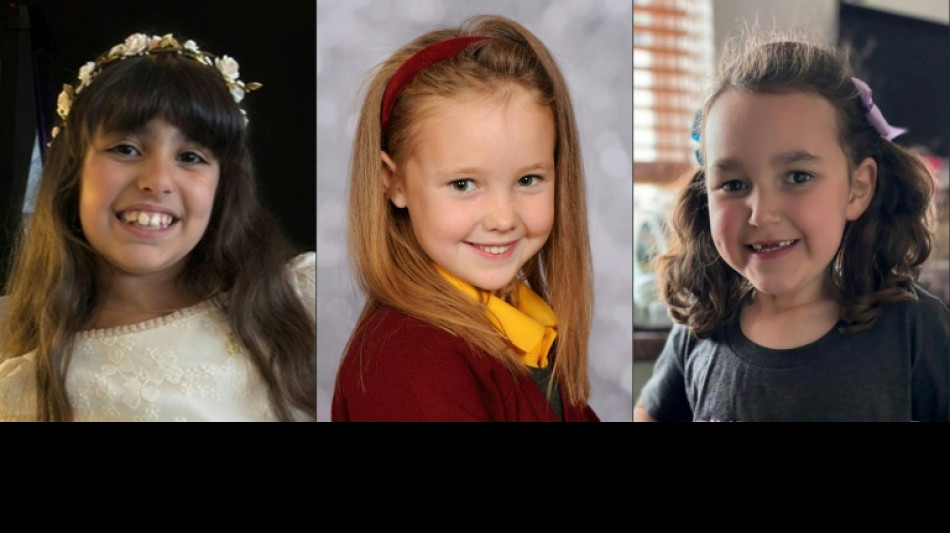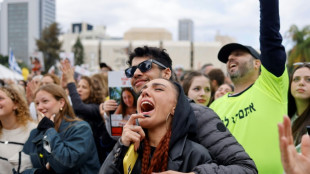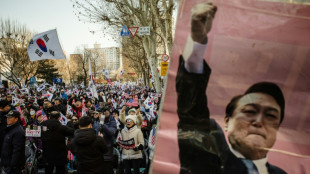

Tears, gasps as UK court hears horrific details of stabbing spree
The families of children killed and wounded by a teenager in a knife rampage that sparked the country's worst riots in years wept in court Thursday as prosecutors described the frenzied attack.
Sobs and gasps were heard as prosecutor Deanna Heer set out details of the stabbing spree by 18-year-old Axel Rudakubana at a Taylor Swift-themed dance class last July in Southport, northwestern England.
Rudakubana was heard to say: "I'm glad they're dead," after he was arrested, Deanna Heer for the prosecution told the court. She described how he burst into the dance class in the seaside resort where a group of young girls were sitting on the floor making bracelets, listening to Swift's songs.
On the day of the July killings, she said, Rudakubana searched online for information about a stabbing at a Sydney church earlier in the year.
He then travelled to the dance class venue by taxi armed with a 20-centimetre-long (eight-inch) kitchen knife.
"Within 30 seconds, screams can be heard coming from within, followed by children fleeing from the building," Heer said.
Rudakubana has confessed to killing the three girls who died in the attack -- Bebe King, aged six, Elsie Dot Stancombe, seven, and nine-year-old Alice da Silva Aguiar.
He was to be sentenced later Thursday, but was ordered out of court by the judge minutes after his delayed hearing began at Liverpool Crown Court for shouting repeatedly "I feel ill."
Heer said that on July 29, dance teacher Heidi Liddle was sitting on the floor helping the children make bracelets when she saw Rudakubana enter and begin "lunging through the children".
She started pushing the children towards the exit, but after one of the girls ran towards the toilet she followed her and locked the door.
"Outside, they could hear children screaming, and then the door rattled. When she heard voices outside the door crying for the defendant to stop she realised that not all of the children had managed to escape," Heer said.
Some relatives in the public gallery were in tears. Others sat with their heads in their hands and wiped their eyes with tissues as tough CCTV footage showed frightened children fleeing the scene.
Rudakubana has also pleaded guilty to 10 counts of attempted murder -- of eight children and two adults -- and possessing a blade.
And he admitted producing a biological toxin -- ricin -- and possessing an Al-Qaeda training manual. Judge Julian Goose warned Rudakubana after his guilty pleas on Monday that he faced a long custodial sentence.
- 'I feel ill' -
Arriving in court earlier Thursday, Rudakubana turned to a dock officer and said, "I'm not fine, I feel ill", urging the judge "don't continue", adding he had not eaten for 10 days.
Various UK media reported he had been taken to hospital early Thursday, but this was not confirmed.
The judge told the court he had been assured Rudakubana was fine to attend, and allowed a doctor to examine him after ordering him from the court for shouting.
The teenager's rampage triggered a wave of revulsion in the UK.
But viral misinformation that the perpetrator was a Muslim asylum seeker sparked anti-immigrant riots in more than a dozen English and Northern Irish towns and cities.
Rudakubana was in fact born in Cardiff to parents of Rwandan origin, and lived in Banks, a village northeast of Southport.
His Christian church-going parents, both ethnic Tutsis, came to Britain in the years after the 1994 Rwandan genocide.
The attack has not been treated as a terror incident and he was never charged with terrorism offences -- prompting criticism from some.
A public inquiry has been announced to probe how police, courts and welfare services "failed to identify the terrible risk and danger to others that he posed," interior minister Yvette Cooper said.
- 'Devastating' -
"This is a tragedy from which the families involved will never recover," Andrew Brown, the founder of the Stand Up for Southport community group, told AFP.
"That this atrocity could have been prevented on several occasions but those opportunities were never taken, is devastating," he said.
The unrest linked to the killings lasted nearly a week. Rioters attacked police, shops and hotels housing asylum seekers as well as mosques. Hundreds were arrested and charged at the time and over the subsequent months.
Authorities blamed far-right agitators for fuelling the violence, including by sharing misinformation about the attacker.
Following the guilty pleas and the lifting of court reporting restrictions, new information has emerged about Rudakubana.
He had been referred three times to the government's nationwide anti-extremism scheme, Prevent, over concerns about his obsession with violence.
He had also been excluded from school, with reports suggesting that when he was 13 he was bullied and had started carrying a knife.
R.Martins--LiLuX



